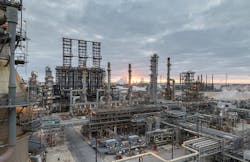Valero commissions Port Arthur refinery’s delayed coking project
Valero Energy Corp., San Antonio, Tex., has started up a new 55,000-b/d delayed coker and sulfur recovery unit at the operator’s 395,000-b/d refinery in Port Arthur, Tex. (OGJ Online, Apr. 14, 2020).
Completed in March and officially beginning operations on Apr. 5, the $975-million delayed coking project enhance the Port Arthur refinery’s ability to process incremental volumes of sour crude oils and residual feedstocks, as well as improve turnaround efficiency at the site, Valero said in its first-quarter 2023 earnings report.
Alongside an anticipated increase in the refinery’s throughput capacity, the new unit also will slash the operator’s imports of vacuum gas oil.
“[Startup] of the Port Arthur coker goes a long way to shoring up our VGO position [by] taking resid and heavier crudes and cracking [them] into sort of [a] distillate and essentially a VGO-boiling range material,” Lane Riggs, Valero’s president and chief operating officer, said in an Apr. 27 quarterly earnings call with investors.
“Our requirement for importing VGO has [already] fallen post the new coker startup,” Riggs said, adding that unit—as of the week beginning Apr. 24—had ramped up to projected rates.
Project details
In its latest investor presentation dated September 2022, Valero said Port Arthur’s new delayed coker project would create two independent combined crude distillation unit (CDU)-vacuum distillation unit (VDU) coker trains at the refinery that, in addition to improving turnaround efficiency, also aimed to reduce maintenance-related lost margin opportunity.
Rather than adding new crude processing capacity to Port Arthur’s nameplate capacity, the delayed coking project instead was designed to enable full utilization of the refinery’s existing CDU capacity, as well as the site’s yield of light products, according to the operator.
As of September 2022, Valero estimated the new delayed coker would enhance the refinery’s capability to process incremental volumes of sour crude and resid feedstocks by 102,000 b/d and 21,000 b/d, while reducing its demand for VGO by 47,000 b/d.
Incremental increases to production volumes to be enabled by startup of the unit were estimated as of September 2022 as follows:
- Diesel; 43,000 b/d.
- Gasoline; 15,000 b/d.
- LPG; 4,000 b/d.
- Naphtha; 3,000 b/d.
About the Author
Robert Brelsford
Downstream Editor
Robert Brelsford joined Oil & Gas Journal in October 2013 as downstream technology editor after 8 years as a crude oil price and news reporter on spot crude transactions at the US Gulf Coast, West Coast, Canadian, and Latin American markets. He holds a BA (2000) in English from Rice University and an MS (2003) in education and social policy from Northwestern University.

